- Home
- Jay Bonansinga
Shattered Page 4
Shattered Read online
Page 4
On each occasion, it was an added bonus to watch the great Special Agent Ulysses Grove inspect the cameraman’s handiwork (while the cameraman taped it all for the world to see). In Memphis, for instance, the experience was so exciting it gave the cameraman a temporary erection, and he had to leave under the false pretenses of food poisoning.
But now it was quickly becoming apparent that the investigation was progressing faster than the cameraman had hoped. This prodigious profiler was going to eventually track the cameraman down…and ultimately learn about the warehouse. That much seemed certain.
Right then the cameraman froze.
Through the lens, in the distance, amid the huddle of FBI agents and sheriff’s deputies, a gap had formed between two beefy investigators, and all at once, Ulysses Grove became visible in all his Burberry and pinstriped glory—and he was glancing this way, as though he were gazing through the cameraman’s own lens!
Like a drill penetrating the bone of the cameraman’s skull and burrowing into his brain!
The cameraman lowered his camera, turned away, and trundled back toward his four-wheeler. He had to get out of there. He could not take it anymore. He couldn’t breathe. He climbed into his truck, slid the camera across the passenger seat, then fired up the engine.
The SUV lurched, and he almost ran over one of the reporters as he roared back toward the two-lane. He didn’t even look back. He was shaking as he sped away into the overcast afternoon. Something had to be done. Something had to be done about this genius from the FBI.
Something drastic.
FOUR
Henry Splet, ace cameraman and father of four, drove through the gated entrance of Pinehurst Meadows with an ash pit of worry smoldering in his stomach. He drove past the flower beds and flagstone ramparts, with his windows rolled down, despite the rain. He couldn’t breathe with the windows shut. He needed the cold, wet air on his face in order to think.
A thin, stooped man with a translucent pale complexion, Henry was one of those types who always looked like his clothes were too big, his skinny neck swimming in his collar. Today was no exception. He looked so wan and fragile in his WJID windbreaker that he appeared almost spectral, ghostly. It wasn’t just his advanced age—which, at fifty-seven, was ancient for a news camera operator—it was also his demeanor, the way he carried himself, his expression. In the rearview mirror, he saw his sunken, haunted, gray eyes, his emaciated cheeks. He looked like death.
He steered the SUV onto Elderberry Court, and headed for the last driveway on the right. Home sweet home. Time to put on his good-Christian-husband-and-father mask. Henry wore many masks, but this one was his favorite. It almost made him forget his secret compulsion. He grinned as he turned in to the driveway of the tidy little split-level ranch house.
He parked and turned off the SUV as the rain drummed against the vehicle’s roof. Through the windshield, which was quickly beading with raindrops, he could see his cozy little domicile: its gabled roof pitches and pale blue siding accented by lushly planted flower boxes. The flower boxes were Helen’s handiwork. Helen Splet insisted on a cheerful, herbaceous home. She grew up in the Pennsylvania hinterland, the daughter of an Amish dairy farmer, and she still clung to many of the old ways, despite her conversion to evangelical Baptism in her early adulthood. From the butter churn on the porch, to the Early American antiques throughout the house, Helen wore her country roots on her sleeve.
“Daddeeeeee!”
Henry was getting out of the SUV when his youngest came toddling across the porch, the screen door slamming. The three-year-old was named Ethan, and he was a carrottop with perpetual tracks of green snot under his little pug nose. “Daddeeee—Daddeee—I make poopoo in the toi-wet.”
“Attaboy!” Henry scooped the redhead off the steps and hugged him. “I knew you could do it!”
The little boy jabbered about getting a sucker for his good work as Henry carried the child through the front door and in to the fragrant living room. The air smelled of pot roast and lemon wax. Helen Splet, her dishwater blond hair pulled back in a severe bun, her once-luminous blue eyes now getting a little creased around the edges, came striding in from the kitchen, wiping her hands on a towel. “Daddy’s home,” she called up the stairs.
An immediate rumble of footsteps issued from the second floor. Helen smiled as she approached her husband, kissing his cheek. “Long day?”
Henry put the child down. “How did you know?”
“You look tired.”
“You don’t know the half of it,” Henry said and put his battery belt down on the little deacon’s bench by the fireplace. With mild surprise he noticed a ruby fleck of blood under one of his fingernails from the murders he had committed the previous night in the woods along the Mississippi. “Three breaking stories in one day.”
He went into the bathroom and washed his hands, paying close attention to his nails. Then he stared at himself in the mirror for an inordinately long moment as his fingertips dripped. Finally he emerged and went into the den where his daily martini was waiting for him (dry, two olives). Helen had already laid out his nightly pre-dinner ritual on a TV tray next to his Barcalounger: an ashtray with his pipe, a fresh pouch of cherry brandy tobacco, the day’s St. Louis Post-Dispatch, and the mail.
A whirlwind of children blew into the den as Henry went through his mail and sipped his martini. Caleb, his oldest, wanted to talk about the chess club. Rachel, his ten-year-old, wanted Henry to know it was high time she got that pony he had been promising her. And little Mary just wanted to sit on Daddy’s lap while he perused his mail and his newspaper. Henry took it all in with good humor and fatherly patience…right up until the moment he saw the little banner headline across the top of that week’s Time magazine.
A twinge of alarm pinched at Henry’s gut.
“Dinner’s ready, everybody!”
The sound of his wife’s voice snapped Henry out of his daze. “Be there in a sec!”
Henry quickly thumbed through the magazine until he got to the Current Affairs section and saw the subheading at the top of the right-hand page: “Superstar Profiler Zeroes in on Latest Quarry.” Henry’s hands trembled as he skimmed the article written by the Midwestern bureau chief, the gist of the story laid out in the opening paragraph:
St. Louis, MO; Famed FBI criminologist, Special Agent Ulysses Grove (Issue #44:15), claims he is about to nab another killer. In an unprecedented buildup of evidence—both circumstantial and physical—Grove now believes that positive identification of the suspect known as the Mississippi Ripper is imminent. “We now know so many things about this person,” the profiler explained from his Virginia office Friday. “We are fairly certain he is white, middle class, probably the head of a large family. Very likely a tradesman or artisan in some technical field.” Grove went on to explain that due to DNA results from recent double homicides in Davenport and Memphis, the Bureau is literally days away from finding a match. “It’s only a matter of time now,” Grove went on. “And chances are he will turn out to be the guy next door.”
“Sweetheart?”
Henry looked up from the magazine like a man coming out of a dream. “Huh?”
Helen was standing in the archway leading into the dining room, drying her hands in a dish towel, a strand of hair dangling in her eyes. Behind her, the kids were taking their seats at the table. “Are you all right?”
Henry smiled with a twitch. “You bet…just a little bushed. Man-oh-man, that smells good. Let’s dig in.”
He went into the living room and took his place at the head of the table. A steaming bowl of mashed potatoes sat magisterially in front of him, puddled in the center with melting butter. An array of comfort food spanned the center of the table: brisket, gravy, green bean casserole, and buttermilk biscuits. The air was sultry with caramelized odors.
“Caleb, please, pipe down now with the Gene Krupa,” Henry said to his son, who was drumming his silverware on his plate, while Rachel and Mary sat like good little girl
s with their hands folded for grace, and Ethan scratched invisible pictures on his highchair tray. Helen took her seat, and Henry tried to concentrate on the dinner prayer. “Thank you, Father, for these Thy gifts which we are about to receive, from Thy bounty, through Christ our Lord, amen.”
Everybody parroted his amen, and then the bowls were passed, and meat was sliced, and food was spooned onto plates, and Henry tried to act nonchalant, smiling at his little girls, winking at his wife, grinning at his sons, while somewhere way back in the beehive of his psyche, he was plotting, scheming, trying to figure out what to do about this annoying, nosy agent from the FBI, this handsome black pest.
By the time dessert was served—Henry’s favorite: sponge cake with Hershey’s chocolate sauce—he knew exactly what he was going to do about Grove.
That night, Grove took the red-eye back to Virginia. It was a blustery spring evening across the Eastern seaboard, and the flight was delayed for a little over an hour due to lightning storms over the Smoky Mountains.
Grove took advantage of the downtime on the tarmac at St. Louis International to text-message the Ripper task force. He told the key people back at Quantico about the breakthrough with the eye surgeon, and he lit a fire under the lab people to put a priority rush on the DNA samples from the Adams County scene. This was the final act before apprehension. Grove could sense it like the whiff of sulfur before a match head ignites: He was going to catch this son of a bitch. Very soon.
Hopefully before the bastard had a chance to kill again.
Grove’s plane finally got airborne around 7:30, and hammered up through the turbulent atmosphere with Grove holding on to his armrests and loose file folders for dear life. He had grown so accustomed to flying that he rarely even buckled his seat belt, but tonight was different.
Tonight he buzzed with nervous tension, and was hyperaware of the flickering slipstream of icy rain outside the hermetically sealed fuselage. He tightened his belt and loosened the collar of his crisp blue oxford-cloth shirt. He still wore his Armani jacket with the orchid silk hankie tucked into the breast pocket, and the sterling cuff links fastened tight. He still looked neat, and orderly, and professional—like a successful black attorney or a renowned African American captain of industry—all of which helped him think and stay organized.
In fact, for most of that short, bumpy flight back to Reagan International, he made lists in his notebook, in his tight, obsessive ballpoint scrawl: people to brief on the latest developments in the Ripper case, calls to make the next day, tactical assignments to make once the Ripper was identified. The two-hour journey passed in a flash, and before Grove even realized it, the plane was on its descent into Reagan.
The airliner landed in a flurry of noise and flashing silver light.
Ten minutes later, Grove was inside the terminal.
“I’m also going to need you to run a check of all the major medical schools in the Mississippi River Valley region,” he barked into his cell phone as he strode through the glass tunnels of Reagan International Airport. He had his raincoat slung over his shoulder now. He had only been on the ground for a few minutes but already had a team of four people on a conference call. On the line were a couple of data specialists at Quantico, Agent Menner in St. Louis, and Dr. Wendal Booth, the head of the School of Ophthalmic Surgery at Iowa City Medical Center.
“May I ask what you’re looking for?” Doctor Booth’s tobacco-cured voice broke in.
Grove told him he was looking for anything out of the ordinary, any record of failed ophthalmology students, dropouts, disciplinary problems.
“That’s a wide net,” the doctor said with a wry chuckle.
Another voice piped in: “What are we matching them with?”
Grove recognized the voice of Petra Bartoni, a young whiz kid working her way up the ranks of the FBI’s byzantine headquarters staff. Grove told her to match them up with anybody in the same region with a criminal jacket or a history of mental illness.
“Got it.”
Another voice: “Been a lot of press on this one, a lot of flight opportunity.”
Grove let out a sigh. He knew the sound of skepticism in Big Bill Menner’s voice, and he knew there was a distinct possibility that the killer could indeed be halfway around the world by now. But something bone deep inside Grove told him that the killer was within his grasp. A clock ticked in his brain now—the same clock that always began incessantly ticking as he closed in on a subject.
“I think he’s savoring all the ink,” Grove finally said as he descended the escalator into the baggage claim area. Ahead of him, the giant glass doors loomed, streaked with rain, leading out into the parking complex. “We can talk more about this tomorrow…right now I’m going to have to sign off. We can reconnect tomorrow with the lab people.”
Everybody said their farewells, which was followed by a series of clicks.
Grove snapped his phone shut, then shrugged on his raincoat, grabbed his suitcase, and headed for the exit…completely oblivious to the complex dance that had already started.
FIVE
By the time Grove got home it was close to midnight. The rain had stopped hours earlier, and now the stars had come out over the Shenandoahs. Grove’s little neighborhood lay glistening in a hushed tableau, the air perfumed with pine and wet tar. Only the crickets and the dripping gutters were audible as Grove pulled his sedan into his garage.
The house was as silent as a church. Upstairs Maura and the baby were both sound asleep.
Grove went into the kitchen and found a note Maura had left for him on the butcher block island welcoming him home and telling him about the leftover pork chop in the fridge and Aaron’s new bottom front tooth and the basement toilet getting clogged by a stray baby wipe. Grove stood there in his damp raincoat, savoring every word of the note.
All this banal domestic minutia was a salve on Grove’s burning, restless soul. He was still plagued by visions of dark men and dark acts, still driven by a blood heritage he could not fully understand. But just as he was born to hunt monsters, he was also born to be a husband and a father.
He was making himself a nightcap—a single malt with a splash of water—when he heard Aaron stirring and cooing anxiously behind the door at the top of the steps. Grove put down his drink, then hurried up the carpeted stairs, careful not to wake Maura.
Aaron’s room was sultry with powdery baby smells and humidified air. A night-light burned in the corner—an orange plastic Tigger head. As Grove entered he could see the silhouette of his firstborn son busily flapping his arms inside the bars of his crib.
Little Aaron Grove was a big, brown, doughy baby with huge eyelashes and close-cropped nappy black hair. His looks were a pleasing mixture of his light-skinned black father and WASPy mother, though his personality was all his own. He was simultaneously cheerful, noisy, and sickly. He always seemed to have some sort of discharge going, either a leech trail of snot from his little turned-up nose or a crust of gummy mucus in the corner of each gigantic doe eye. But whenever he grinned his snaggletoothed grin at Grove, he was just about the most beautiful creature ever to cross Grove’s path.
“C’mere, Slick,” Grove muttered genially under his breath as he scooped the baby out of the crib.
“Puh!”
The word—if you could call it that—came out of the little duffer on a half belch, and the sound of it made Grove’s eyes water with glee. It wasn’t exactly a perfect enunciation of the word “Papa,” but it was close enough. Grove hugged the baby to his cheek and breathed in the talcum and cream aroma of the child’s latte-colored skin.
“You been a good boy for Mommy?” Grove looked at Aaron’s mouth, saw the little white Chiclet peaking out of his drool-soaked lower gum. “All the teething keeping you up?”
“Puh!”
“That’s right—Puh’s here!”
Grove hugged the baby once more for good measure, then turned, carried the child out of the room, and descended the stairs.
Maur
a had left a bottle of breast milk in the fridge alongside the pork chop, and Grove made himself and the boy a midnight snack. Grove sliced the chop thin, toasted a kaiser roll, and heated the bottle in the microwave. Then the twosome retired to the screened-in porch jutting off the rear of the house to dine in the dark silence and watch the distant storm retreat over the northwest range of the Shenendoahs. They snuggled into an Adirondack chair, the baby in Grove’s lap, chewing contentedly on the bottle’s nipple, Grove munching on his sandwich. The cool air smelled of ozone and pine. In the far distance the heat lightning snapped across the granite peaks like tinsel.
Grove could not get the the Mississippi Ripper out of the rear chambers of his mind.
It was something that he avoided whenever possible—thinking about this stuff around his family—but sometimes it was just plain irresistible. And tonight he could not shake the sensation that he was on the cusp of another takedown. All he had to do was collate the latest breakthroughs with the lab, and get Brian Dunham at Quantico to do his magic with the Violent Criminal Apprehension Program data, and close the net.
Aaron tossed the empty bottle across the porch, and then fidgeted in Grove’s lap.
“Okay, okay already,” Grove murmured and rose and gently put the baby down on the Astroturf floor where a pile of Fisher-Price plastic beads and blocks lay strewn. Aaron immediately started cooing and batting at the toys.
Grove started pacing, thinking about something he forgot. He pulled his cell phone out of his pocket and placed a call to Los Angeles. It was 10:00 P.M. on the west coast and still early enough to catch Cedric Gliane, the world’s foremost DNA expert, before he faded away for the night.
“Gliane here,” the voice crackled in Grove’s ear.
“Cedric, it’s Grove.”

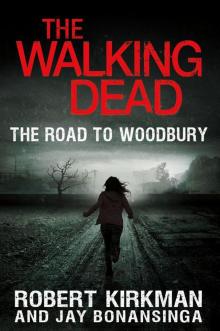 The Walking Dead: The Road to Woodbury
The Walking Dead: The Road to Woodbury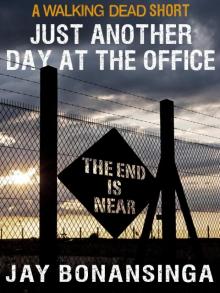 Just Another Day at the Office
Just Another Day at the Office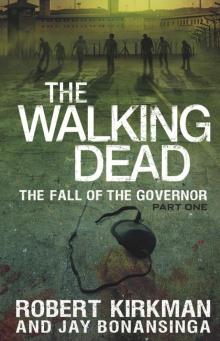 The Fall of the Governor: Part One
The Fall of the Governor: Part One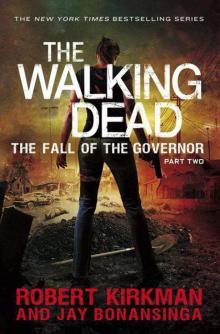 The Walking Dead: The Fall of the Governor: Part Two
The Walking Dead: The Fall of the Governor: Part Two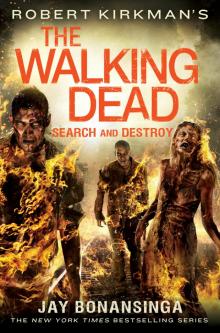 Search and Destroy
Search and Destroy Invasion
Invasion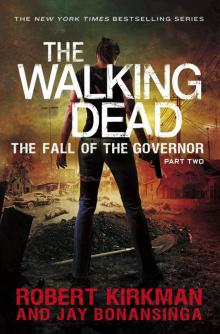 The Fall of the Governor: Part Two
The Fall of the Governor: Part Two The Walking Dead Collection
The Walking Dead Collection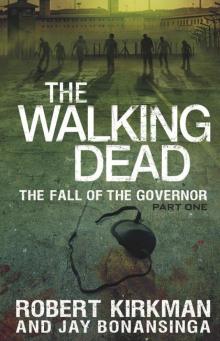 The Walking Dead
The Walking Dead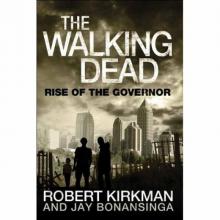 Descent
Descent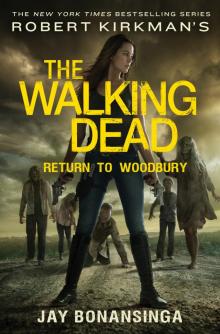 The Walking Dead: Return to Woodbury
The Walking Dead: Return to Woodbury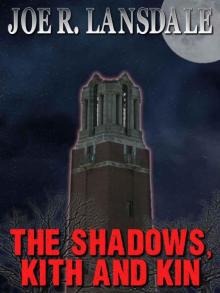 The Killer's Game
The Killer's Game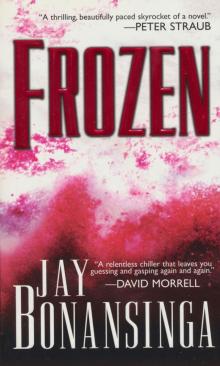 Frozen
Frozen Shattered
Shattered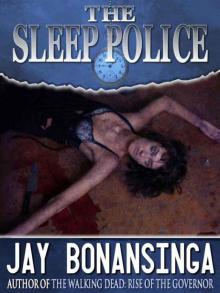 The Sleep Police
The Sleep Police Perfect Victim
Perfect Victim